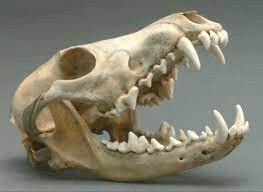Animals that breathe under water have this specific body part...
gills
Animals that cannot survive in cold environments sometime have behaviors that allow them to live through winter months. Name two of these behaviors.
hibernation & migration
This plant part takes attracts pollinators and sometimes develops into the fruit or vegetable of the plant.
flower
What is something many adult insects can do but that young/adolescent insects cannot do.
fly or reproduce
Name a physical characteristic that helps an animal survive in water.
**answers may vary**
gills, fins, etc

Based on the teeth in this animal, what type of food does it eat?
Meat (carnivore)
What do we call animals that have specialized body parts that allow them to stay awake during the night are called ______.
nocturnal animals
This plant part carries water and nutrients from the roots & and food from the leaves to the rest of the plant.
stems
Name the stages of incomplete metamorphosis.
egg --> nymph --> adult stages
Name at least three species (types) of insects that go through incomplete metamorphosis.
grasshoppers
crickets
beetles
dragonflies
praying mantis
roaches
Spiders are able to use this unique physical characteristic to build their shelters.
silk
Some predators hunt in packs, is this considered a physical characteristic or a behavioral adaptation?
behavioral adaptation
What is the roles of the leaves?
Leaves take in sunlight & air then create food for the plant through photosynthesis.
The larva stage of a butterfly is also known as _____.
The pupa stage of a butterfly is also known as _____.
The larva stage of a butterfly is also known as caterpillar.
The pupa stage of a butterfly is also known as chrysalis.
Our intelligence, complex communication.
What is mimicry?
A special type of camouflage when something harmless looks and/or acts like another animal that is either dangerous or poisonous so that predators don't risk eating it.
Name a physical characteristic of cheetahs that help them meet their basic needs.
Long legs, large chest that allow them to run very fast.
Sharp claws and teeth that allow them to catch prey.
What is the role of the roots?
This plant part takes in water and nutrients from the soil & anchors the plant in the ground.
Name the stages of complete metamorphosis.
egg --> larva --> pupa --> adult stages
The spines or thorns of a cactus are highly adapted leaves that help it survive in a desert. Explain why.
The desert they grow in have a LOT of sunlight, so traditional leaves aren't needed to take in the sunlight to make food.
Eagles are able to spot prey from very high up in the sky, name at least two physical characteristics they have that allow them to do this.
wings and excellent eyesight
What is echolocation? Name at least one animal that uses this behavior.
Why are the seeds important to a plants survival?
Seeds ensure that a plant can reproduce to make more plants.
How are incomplete and complete metamorphosis different?
(MUST SAY ALL)
The young of insects that go through incomplete metamorphosis look like miniature versions of the adults but cannot fly or reproduce.
The young of insects that go through complete metamorphosis look NOTHING like the adults and have an inactive pupa stage where their physical characteristics change dramatically.
Marsupials have a special type of shelter for their young, explain this shelter and give an example of a marsupial.
They have a pouch where their babies are born into. The babies stay in the pouch for many months while they are very small and vulnerable to predators. When they get a little bigger they can go in an out of the pouch as necessary to escape danger. Some examples are: kangaroos, wombats, possums, koalas, Tasmanian devils, etc.